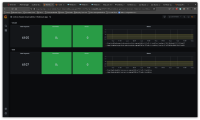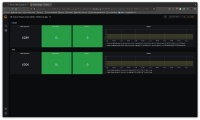-
Task
-
Resolution: Done
-
Normal
-
1.20.0
-
False
-
-
False
-
No
-
RC2
Origin: tests/upgrade/n02b-upgrade-rhoam.md
Prerequisites
To prepare a cluster for the upgrade testing the current GA version must be in managed-tenants repo.
Description
Measure the downtime of the RHOAM components during the RHOAM upgrade (not to be confused with the OpenShift upgrade) to ensure RHOAM can be safely upgraded.
Note: This test includes all steps to prepare the cluster before the upgrade, trigger the upgrade and collect downtime reports
Note: If N09 test case is scheduled to be verified for the release, it might be good to do it first (once the pre-upgrade cluster is ready for the upgrade - after the step 2)
Prerequisites
- Node.js installed locally
- ocm CLI installed locally
- jq v1.6 installed locally
- cluster with the current RHOAM GA version installed on it. Such cluster is typically created via the addon-flow pipeline when the RC1 is not yet merged into MT (or reverted back to GA).
- testing-idp is configured on the cluster
Steps
- Login via oc as a user with cluster-admin role (kubeadmin):
oc login --token=<TOKEN> --server=https://api.CLUSTER_NAME.s1.devshift.org:6443
- If the workload-web-app is not deployed on the cluster (it should be since it can be done via addon-flow pipeline), clone the workload-web-app repository and run the following command:
git clone https://github.com/integr8ly/workload-web-app cd workload-web-app export GRAFANA_DASHBOARD=true RHOAM=true make local/deploy
Note: do not re-deploy if the workload-web-app is already present in the cluster - check if workload-web-app namespace exists in the cluster or not.
There should be no errors in the command output and product (3scale, SSO) URLS should not be blank. Alternatively, you can check the Environment tab in workload-webapp namespace in OpenShift console. See step 8 and 9, you might want to do these pre-upgrade as well.
- Prepare corrupted users on the cluster (existence of such users must not break the upgrade). Each user needs to have 3scale account created. In order to do that make sure to log into 3scale Admin Portal (via Openshift, testing-idp IDP) using the user before proceeding with the oc commands below. This command can be used to get the route to 3scale Admin Portal:
echo "https://$(oc get route -n redhat-rhoam-3scale | grep 3scale-admin | awk '{print $2}')"
Pick one regular user (test-userXX, not customer-adminXX), log into 3scale Admin Portal and remove user's identity:
oc get user <test-userXX> -o jsonpath={.identities} #should be just one identity there
oc delete identity <identity-name-from-the-command-above>
Pick another regular user (test-userXX, not customer-adminXX), log into 3scale Admin Portal, remove the user and make sure user's identity remained:
oc get user <test-userXX> -o jsonpath={.identities} #should be just one identity there
oc delete user <test-userXX>
oc get identity <identity-name-from-the-oc-get-command-above> # identity should be found
Pick yet another regular user (test-userXX, not customer-adminXX), log into 3scale Admin Portal and create additional identity for the user (so there are two identities in total):
oc create identity testing-idp:<test-userXX-02>
oc create useridentitymapping testing-idp:<test-userXX-02> <test-userXX>
oc get user <test-userXX> -o jsonpath={.identities} #should be two identities there
- Use the command below to check whether the installPlan exists and is approved.
oc get installplans -n redhat-rhoam-operator
You can check whether the installplan is for the proper RC by examining the output of the command below.
oc get installplan install-<hash> --namespace redhat-rhoam-operator -o yaml
In case release candidate is service affecting, you need to approve the installPlan first.
oc patch installplan install-<hash> --namespace redhat-rhoam-operator --type merge --patch '{"spec":{"approved":true}}'
- Poll cluster to check when the RHOAM upgrade is completed (update version to match currently tested version (e.g. 1.8.0)):
watch -n 60 " oc get rhmi rhoam -n redhat-rhoam-operator -o json | jq -r .status.version | grep -q "1.x.x" && echo 'RHOAM Upgrade completed\!'"
This script will run every 60 seconds to check whether the RHOAM upgrade has finished
Once it's finished, it should print out "Upgrade completed!"
- In OpenShift console, click on the "bell" icon in the top right corner. Go through the notifications that were generated in the time between the RHOAM upgrade started and ended.
Verify that there were no RHOAM-related alerts firing during the upgrade
If unsure whether the alert is RHOAM-related, consult it with engineering
- Go to the OpenShift console, go through all the redhat-rhoam- prefixed namespaces and verify that all routes (Networking -> Routes) of RHOAM components are accessible
If some of the routes are not accessible, try again later. If they won't come up in the end, report the issue.
- In anonymous browser window, log in to OpenShift console as a user with dedicated-admin permissions (e.g. "customer-admin01"), click on the dashboard icon on the top right corner
Validate that all 3 links under OpenShift Managed Services (API Management, API Management Dashboards, API Management SSO) are accessible and you can log in.
- Clone delorean repo and run the following command to generate a downtime report using the delorean cli:
cd delorean make build/cli ./delorean pipeline query-report --namespace redhat-rhoam-observability --config-file ./configurations/downtime-report-config-rhoam.yaml -o <output_dir>
There will be a yaml file generated in the output directory. Upload the file to the JIRA issue. Upload the file to this google drive folder
Note: the critical 3scale components that must not report any downtime are apicast-production, backend-worker, and backend-listener. On the other hand, the non-critical 3scale components that are ok to experience short downtime (up to 2-3 minutes) are backend-cron, zync-database, system-memcache, system-sphinx.
- Open the RHOAM Grafana Console in the redhat-rhoam-observability namespace
echo "https://$(oc get route grafana-route -n redhat-rhoam-observability -o=jsonpath='{.spec.host}')"
- Select the Workload App dashboard
Verify that 3scale and SSO are working by checking the Status graph.
Take the screenshot of the dashboard and attach it to this ticketNote: when testing the RHOAM upgrade the dashboard must be verified also after the upgrade and any downtime during the upgrade should be reported as issues (also make sure that the screenshot of the dashboard post-upgrade is attached to this Jira)
Note: it's normal that graph will show a short downtime at the start for 3scale because the workload-web-app is usually deployed before the 3scale API is ready, see MGDAPI-1266
Note: Downtime measurement might not be 100% reliable, see MGDAPI-2333
- Consult the results with engineering (especially in case some components have a long downtime or are not working properly)
General guidelines for testing
- blocks
-
MGDAPI-3865 J08B - [DESTRUCTIVE] - backup-restore - Verify User SSO Backup and Restore
-
- Closed
-

